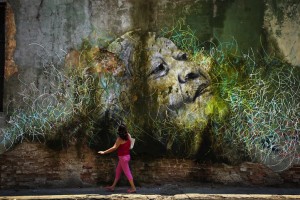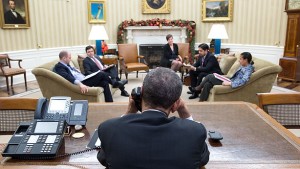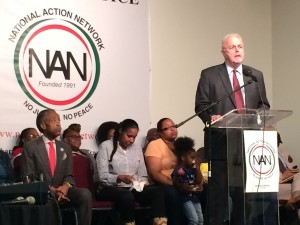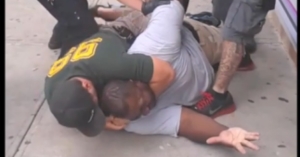Podcast: Play in new window | Download
U.S. Cuban Foreign Policy Changes Strategy: Normalizing Relations
We’re joined today by attorney Michael Krinsky, a partner in the famous law firm of Rabinowitz, Boudin, Standard, Krinsky & Lieberman. This the firm that almost has been from the beginning representing the government of Cuba. We speak with Michael about the dramatic reversal of policy and the recognition by the United States of the Cuban government and the eventual establishment of joint embassies. We also speak about the returning to Cuba of the three remaining anti-terrorist Cuban fighters who have been in American prisons for 16 years. Three men of the Cuban Five. That, plus we discuss the changing of the commercial relationships between the United States and Cuba.
- It was an extraordinary moment. Word got around that Raul Castro was going to talk to the Cuban people on television at Noon, so everyone ran to find a television, including me.
- I think many people expected Obama to take some minor measures to test the waters perhaps to get things moving.
- Most people were quite surprised about the tone of his speech and what he said.
- I happen to be at a conference of US and Cuban scholars, which were talking about US-Cuban relations, that’s where I saw President Castro’s speech. The first thing he said of course was the cuban heroes. The 3 of the remaining Cuban Five and the place broke into pandemonium. People jumped up literally hugging each other. People were crying, then they quieted down and they listened to the next thing.
- And then when he said President Obama and I have agreed to reestablish normal diplomatic relations. There was silence. Then people half a second later absorbed and again there was a tremendous commotion.
- People felt a sense of triumph. After 55 years of holding despite the Bay of Pigs, despite the economic blockade, despite the special period when the trade with the Soviet Union collapsed, they had held on. In the end, someone put it, the United States came to us.
- You could see it in the streets, you could see it in the restaurants, you could see it in the offices. People were happy.
- They were literally smiling for days afterward.
- The embargo has been in effect for 54 years. It’s as comprehensive an embargo as this country has ever imposed, as any country has every imposed against any country.
- It’s not simply the US saying we the United States won’t trade with Cuba. A major part of it is extra-territorial reach. The effort for Cuba to make trade with third countries difficult and impossible.
- They can’t get US parts for their equipment.
- They can’t use US dollars for international transactions, which is the currency of international trade.
- Shipping to Cuba is made extremely difficult because of the US law that says if a ship goes to Cuba it can’t come to the United States for six months.
- Everyone in Cuba lives on a daily basis what they rightfully call a blockade.
- A blockade implies an effort to interrupt, disrupt trade between Cuba and a third country.
- There is nothing there about Cuban products being sold in the United States. It’s all one way.
- Cubans have developed a lot of innovative medical products that doctors are very excited about.
- There was nothing in the announcements about regular airplane service between the two countries.
- (Michael Ratner: The president has the authority to license almost everything, every economic transaction with Cuba at this point)?
- Right export, import, financial transactions, loans, credits, investments, all of these things are within the president’s licensing authority.
- The United States did not want a left wing socialist revolution to succeed in the Americas.
- The theme publicly and internally in the US government, until about 1991, 1992 and then there was a shift. Then for the first time, the United States publicly started talking about the goal of US policy including the blockade was to change the internal character of the Cuban system. The Cuban government.
- Civil liberties, free elections, free speech – those became for the first time the articulated goals of US policy.
- Guantanamo Bay used to be a Naval Station for coaling, ships operated on coal then. There was a 99 year lease between a captive Cuban government and the United States.
- I’m trying to find the right balance between a great deal of enthusiasm and not necessarily skepticism, but caution.
- It was nice to see the State Department make reference to this, the United States has claims for the nationalization the properties of its companies in Cuba in the early days. Cuba has articulated it has much greater claims against the United States for the blockade and for acts of economic sabotage which have died actually over the years.
- There are claims on both sides that have been articulated in the past.
Guest – Attorney Michael Krinsky, has been practicing law for forty-five years. For three decades, he has led the Firm’s representation of Cuba and other foreign governments, and their agencies and enterprises, as well as the Firm’s practice in the area of U.S. embargoes and export controls. Mr. Krinsky graduated from the University of Chicago’s College in 1965 and its Law School in 1968. After working with the American Civil Liberties Union in Newark, New Jersey, he joined the Firm in 1971.
——
NYPD Unions Respond To Police Shootings, Says Protests At Fault
In the wake of the killing of two NYPD officers, a rift has widened amid police unions and the mayor of New York City. The New York City Police Benevolent Association Officers has suggested that the recent demonstrations against police misconduct and police violence have played a role in the execution style murders. To discuss the rhetoric from the police union and the tabloid media, we’re joined by attorney Jonathan Moore.
Attorney Jonathan Moore:
- It is a critical moment here in New York City and around the country on the issue of dealing with over aggressive policing and the militarization of police, I think they go hand in hand.
- We’ve been fighting this battle in New York for at least 15 years going back to the killing of Amadu Diallo and litigated the stop and frisk cases until the end of last year in to this year.
- Police unions have been an absolute impediment to any reform of the police department in the city of New York over the last several years.
- The union of that police department doesn’t reflect the membership anymore. The police department is close to being majority minority. Patrick Lynch is the vestiges of the old guard who never saw a police officer who did anything wrong.
- The overwhelming majority of these protests have been peaceful and law abiding. They have not been about calling for the death of police officers. They’ve been about calling for fair bias-free, constitutional policing.
- To use the death of these two officers as an attempt to stifle what as you say is growing mass movement, that hasn’t been seen in many years, is unfortunate and should be resisted.
- I’m glad that people are out there, these are important issues.
- The daily use of excessive force that goes on in many communities is never registered, never gathered by the police department. That’s a problem.
- The systemic problem is a culture within the New York City police department that has adopted an us against them mentality.
- There has to be a cultural change within the police department.
- In 2011, the police department was doing close to 700 thousand stops and frisks a year. The fear was that if you impeded the stop and frisks in the way they were doing it. We of course they were doing it based on race, and the federal court found that.
- Their alarmist response was if we stop doing stop and frisk, the crime rate will soar.
- They did 50 thousand stop and frisks this year, that’s down 650 thousand. That’s because they made a change. They stopped imposing quotas on police officers.
- By the way, on the pace of doing 50 thousand this year, and crime is still going down.
- What does that tell you. It tells you for all these years, they were unnecessarily harassing and stopping and frisking, young black men and young Hispanic men, mostly in our communities for no good reason.
- These unions blindly defend officers when they engage in misconduct and that hurts all police officers, all correction officers.
- In an organization like the NYPD of 35 thousand sworn officers, there are going to be people who don’t do what they should do. They should be rooted out and removed from the police department.
Guest – Attorney Jonathan Moore, is a civil rights lawyer known for his work in the stop and frisk suit against the city and representing 3 of the 5 wrongly convicted men in the Central Park jogger case in 1989. He is now representing the family of Eric Garner, a father of six who died from a police choke hold.
—————————————————
Please help support Law and Disorder by clicking on Fractured Atlas graphic (link is fixed). This radio show is now a sponsored project of Fractured Atlas, a non-profit arts service organization. Contributions for the charitable purposes of Law and Disorder must be made payable to Fractured Atlas only and are tax-deductible to the extent permitted by law. You can donate as little as 5.00 a month.



